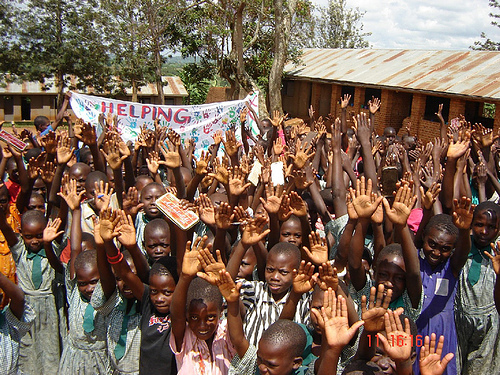OLPCorps RHIT IU CU Uganda
Positive Planet Team
Positive Planet Team (PPT) is a non-profit organization based in New York City and in the Rakai and Masaka Districts in Uganda that creates partnerships between the US and Ugandan schools. Our primary goals are to improve the educational infrastructure of the Ugandan schools and to have the US students see that they can make a positive impact on the world. Over the past 6 years we've raised about $90,000, all of which has been used to build classrooms, water tanks, sanitation facilities, desks, repair roofs, and other similar projects that have affected close to 3,000 Ugandan students.
Members
| Name | Major | Class | University | |
|---|---|---|---|---|
| Rufus Cochran | Computer Engineering | '10 | Rose-Hulman Institute of Technology | cochrarc@rose-hulman.edu |
| Logan Garrett | Business | '10 | Indiana University | lngarrett@gmail.com |
| Allison Slutter | Social Work | MSSW Candidate 2009 | Columbia University | ajslutter@gmail.com |
Project Proposal
Positive Planet OLPC Team Proposal
Background:
Positive Planet is a non-profit organization committed to supporting quality education for the children of Uganda. Similar to OLPC’s vision, Positive Planet believes that all children should have opportunities to learn, self-express and explore. The Positive Planet OLPC Team (PPT) proposes bringing 100 laptops to children in a primary school in rural Uganda. Utilizing Positive Planet’s strong community ties, our plan will deliver computer skills, self-directed learning and access to the world wide web.
Participants:
Rufus Cochran - Computer Engineering undergraduate student from Rose-Hulman Institute of Technology
Logan Garrett - Business undergraduate student from Indiana University
Allison Slutter – Social Work graduate student from Columbia University
Local Partners:
Positive Plant – Since its inception in 2003, Positive Planet has developed strong community ties in the rural district of Rakia, Uganda particularly within the town of Kalisizo, and will help provide resources for housing as well as funding to establish internet connections. Please see http://www.positiveplanet.net.
The St Andrews Matale Hill Primary School – Linked through Positive Planet, the school is a Universal Primary Education School in Kalisizo of 900 students, many of whom are orphans due to the AIDS pandemic. The school will be in session from June through August, so children and space for training will be accessible for the program.
Bank Street School of Education – In conjunction with Positive Planet, this summer, 8-10 graduate students will be traveling throughout the Kalisizo area to participate in training workshops with local teachers. This collaboration will strengthen our plans for program sustainability.
Bank Street College - In conjunction with Positive Planet's work, a group of Masters level education students will be in the Rakai district to take part in training with local teachers. The Positive Planet Team will be working closely with the group of both US education students and local teachers to establish a sustainable curriculum for the students who receive the XOs. In addition, by using teacher knowledge, we will also be able to develop an evaluation and assessment tool to track student progress and learning at the end of the summer and continuing into the future.
Implementation Plan and Impact:
The PPT will focus on OLPC’s core beliefs of child ownership, low ages, saturation, connection, and free and open source, emphasizing younger learners, in order to extend skills, a sense of ownership and project-based learning. We will work closely with the Matale Hill School, the Kalisizo community and the children themselves to identify participants for the program. Selecting students will proceed with careful attention to community input and will work with teachers and community stakeholders. In this way, we will be able to use Positive Planet's connections and trust from local partners that we are confident to pick children that can most benefit from the OLPC program.
The three main parts of the plan are:
Computer exploration/education: The first week focuses on meeting with the students and teachers, demonstrating the XO and developing a rapport so that together, we can most successfully decide which children will participate in the program. After the children receive their computers, we will spend several weeks teaching basic computer skills and exploring the capabilities of the XO to introduce the children to their computer and to develop a sense of ownership.
Project-based learning/development: Based on the OLPC Learning Guide Model, we will use project development to continue teaching skills and assess desired outcomes. After gaining basic computer skills, the children will form teams of 5-6 and start working on projects. Projects will be developed depending on interest and community resources. Project-based learning will help the children engage with their XO and expand their inquiry. Projects will be presented to the community at the end of the summer to highlight the use of the XO and to provide skills assessments and outcome measurements.
Exploratory and self-directed learning: Using the XO computers will vastly promote self-directed learning and will help the children of the Matale Hill School move from rote memorization toward creativity and exploration. We will work in conjunction with local teachers and Bank Street students to create culturally relevant and innovative ways to promote exploratory learning and inquiry. Exploration on the web and direct internet connections with their pen pals from the American sister schools will be encouraged.
IMPACT: This is especially important for children in Ugandan schools, as they are typically not given the opportunity to problem solve, discover or explore in a classroom setting.
Technology Phases:
Matale Hill Local Area Network: Matale Hill School will serve as the hub for all future network infrastructures within Kalisizo’s schools. Steps include:
Setup a server at Matale Hill School using the OLPC provided server.
Install wireless access points around the school so that all laptops can be connected. Local appraisals of Matale Hill will aid in determining the hardware requirements for the wireless network.
Matale Hill Internet Access: Matale Hill will be the hub for internet access. Also, PPT will work with local contacts to explore the possibility of an extended network that can bring internet access to other area schools.
In closing:
Positive Planet and the PPT are committed to partnering with the community of Kalisizo, Uganda. By partnering with OLPC and using the 1:1 laptop concept, we believe that we can empower and engage children and promote innovation, curiosity and learning. The PPT feels privileged to apply and thanks OLPC for its time and consideration.
Pictures of Ugandan School Site
Budget
| Category | Item | Unit Cost | Units Needed | Total Cost | Comments |
|---|---|---|---|---|---|
| Travel | Airfare | $200.00 | 3 | $600.00 | From Kilgali to Entebbe |
| Bus Fee | $150.00 | 1 | $150.00 | From Entebee to Masaka | |
| Airfare | $2,000.00 | 3 | $6,000.00 | Round trip ticket from US to Kigali | |
| Bus Fee | $150.00 | 1 | $150.00 | From Masaka to Entebbe | |
| Lodging | Housing & Food | 10 Weeks | $2,000.00 | Food and lodging will be at local Parrish. Any costs exceeding 2,000 will be paid by Positive Planet | |
| Technology | Surge Protector | $15.00 | 20 | $300.00 | |
| Plug Adapters | $1.00 | 100 | $100.00 | ||
| Toolkit | $50.00 | 1 | $50.00 | ||
| Extension Cords | $10.00 | 10 | $100.00 | ||
| Cat5E Cable | $20.00 | 1 | $20.00 | ||
| Flash Drives | $20.00 | 4 | $20.00 | ||
| TOTAL REQUESTED | $9,700.00 | ||||
|
| |||||
| Additional Contributions | Internet Access at School Site | $2,500.00 | From Positive Planet | ||
| Curriculum Costs | $500.00 | From PPT Fund Raising | |||
| Misc. Costs | $500.00 | 3 | $1,500.00 | To be raised by each PPT member | |
| TOTAL ADDITIONAL FUNDS | $4,500.00 |


